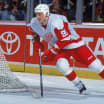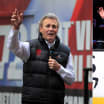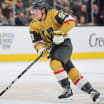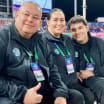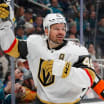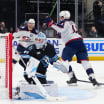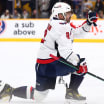PITTSBURGH -- The autograph of Detroit Red Wings icon Gordie Howe - "Gordon," by his longhand - is one of the most familiar and cherished in old-time hockey, in a photo finish with those of Montreal Canadiens' stars Jean Beliveau and Maurice Richard, fellow members of the Hockey Hall of Fame.
All three are perfectly legible, fluid in stroke, sometimes needlessly accompanied by a sweater number to confirm identities for the generations of fans and their heirs who have treasured them.
Howe's autograph was something special
Distinctive signature of 'Mr. Hockey' became part of his lore
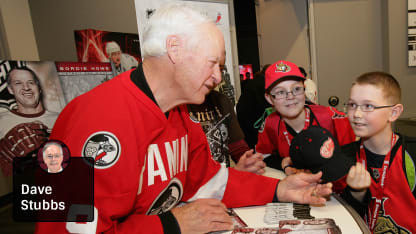
For an hour during a 2012 Montreal sports collectibles show, held in the shadow of Maurice Richard Arena, and for a while longer in a room backstage, Gordie signed his name a couple of hundred times. Everyone who stood before him for even a brief moment in the building's main hall was awestruck; many were almost speechless.
Absently, between signatures, Gordie would flex his hand, curling his fingers almost tight, and you'd see not a fist so much as the business end of a sledgehammer. Long-ago players who blocked it with their unlucky mugs know as much.
The distinctive "G" that he penned on that afternoon is probably unique in the world. It is more of an "S," and how that came to be is part of the rich lore of "Mr. Hockey," who died Friday at age 88.
As a grade-schooler in Saskatoon, Saskatchewan, who lived his winters on a prairie rink, seemingly certain of the fame that one day would be his, Gordie diligently practiced a few different signatures, writing until his fingers cramped.
He offered these samples to his sister, Violet, and she chose the one that he signed tens of thousands of times as the greatest player of his era - No. 1 or 1A of all time with Wayne Gretzky, depending on your argument.
Gordie's was the first autograph I collected as a boy.
The first and the second, in fact.
He signed my first when I was maybe 8, stroked on the back of a bank check of my father's who had Gordie personalize a note to me during Montreal TV personality and famed hockey broadcaster Dick Irvin's annual Sports Celebrity Dinner.
The next was truly memorable, when this 10-year-old met Gordie at a Ford dealership not far from home. My father was considering a new 1967 Mercury Comet, and Gordie was in the showroom that night for a "Shoot To Win" promotion.
That afternoon, the Red Wings legend had been up the road at an Eaton's department store, appearing on behalf of his Truline sporting-goods line, but you couldn't get within a rink-length of him there. By comparison, Fairview Mercury offered a private audience. That night, I slapped a sponge-rubber puck through a gaping hole in a wooden board shrewdly not covering a hockey net; a happy kid was a far better sales tool than free floor mats.
Gordie extended his hand in congratulations, swallowing mine with a paw the size of a first-baseman's mitt, then signed a youth-sized stick as my prize. It was heavy piece of lumber whose blade I reduced to a toothpick playing road hockey until the shaft was snapped in the driveway - backed over by a 1967 Mercury Comet that had joined our family a week after the stick.
"Straight blade, I'll bet!" Gordie joked when I met him at Montréal-Trudeau Airport in 2012, the slope-shouldered legend having arrived with his son, Marty, for the collectibles show.
Gordie hadn't begun signing his name in earnest until after his rookie season in 1946-47, having landed with the Red Wings at age 18. He vividly recalls the rule of iron-fisted Detroit coach Jack Adams, whose Red Wings that season were headed for a fourth-place finish in the six-team NHL and a first-round playoff exit.
"Adams would fine us if we signed autographs in our own building," Gordie recalled. "He said, 'You're paid big money, so we expect you to keep your minds on hockey.' I remember thinking about the fans. If we'd played [expletive], at least with an autograph they'd have had something."
He thought the first signature he collected might have been that of Boston Bruins star Milt Schmidt, whom Gordie would have seen in Toronto while attending school and practicing with the junior Red Wings in Galt, 60 miles west of Maple Leaf Gardens.
"Or maybe I got an autograph a little earlier from a player on the [senior-league] Saskatoon Quakers," he said. "I was fortunate as hell to watch those individuals, even if they were miserable buggers."
This man's formidable statistics were just a sliver of his appeal. His popularity when he signed autographs in Montreal nearly rivaled what it was when he was an All-Star 29 times during a 32-year professional career.
Gordie stopped to consider a 1951 image I'd brought him of teammate "Terrible Ted" Lindsay, an equally fierce competitor whose sharp fangs are cleverly disguised as a smile.
"There was a certain amount of meanness in Ted," he said in understatement. "You needed that to survive."
Gordie would know.
"He knows how to shade the rules," an unidentified Chicago Black Hawks player said of Gordie in a 1964 Sports Illustrated profile. "You do something to him, he won't let on you got to him. But when you come out of the next scramble, you've got four or five stitches you don't know how you got."
Gordie took a suture or two in Montreal through the decades, but he didn't have a chance to reply to a question about his most memorable moment in this city.
"My first NHL playoff goal, right?" Marty jumped in brightly of the Hartford Whalers' 1980 preliminary-round series, a three-game Canadiens sweep.
"If you ever find a picture, you'll see that Gordie ran the netminder [Denis Herron]. Someone bumped him and he just flew into the goalie."
Had referee Bob Myers that night called today's goaltender interference, Gordie would have ended his 2,421-game career with 2,421 penalty minutes.
As he signed his name again and again that Saturday, Mr. Hockey could have told fans how significant this date was in his life: March 24 is the birthday of his sister, Cathy, and a grandson, Nolan; it's also the anniversary of his first, fifth and then-record sixth Art Ross trophies, awarded to the NHL's leading point-scorer, won in 1951, '57 and '63.
Early the next morning, Gordie and Marty Howe boarded a flight west, Vancouver's arms open wide. An airport clerk might have noticed a large scab on Gordie's thick left wrist, the souvenir of a recent nature walk with Murray, the youngest of his three sons.
"He came back looking like he'd run into a bobcat," Marty said. "Gordie was bleeding all over the place, having walked through a thicket of bushes wearing shorts. He took a tumble and he was a mess."
Marty turned to his father.
"You never bled that much in a hockey game."
Gordie, who would turn 84 the following Saturday, just grinned.
"Yes, I did."
He had no problem with that. None at all.
I unpacked my briefcase when I returned home that day, and on an envelope I'd had on the table between us was an autograph for which I had not asked.
Gordon Howe.
I'm pretty sure my knees buckled.
And this only dawned on me upon this wonderful legend's passing on Friday: a check, a hockey stick and an envelope. My own Gordie Howe hat trick.




